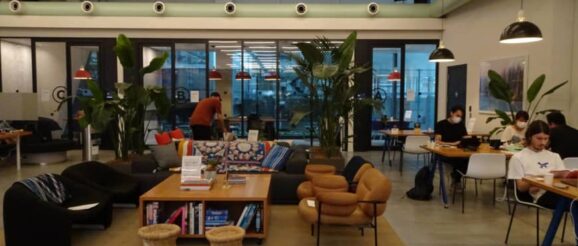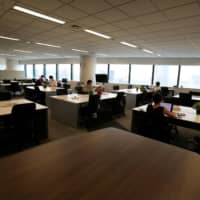Post-pandemic, Japan firms see office as space to foster innovation | The Japan Times

For many Japanese workers, offices probably don’t really mean anything special other than merely being a place to work.
Although some firms are into spicing up offices with fancy furniture and layouts, these spaces are generally quite dull.
Now that the COVID-19 pandemic has accelerated a telework trend in Japan’s rigid business culture, some companies that have successfully managed a switch to remote systems this year are facing a tough question — what should they do with their now underused offices?
Some companies including big names have already taken it a step further, revealing what appear to be bold plans on modifying office functions for the new normal.
While trying to define new roles for offices, many companies hold the view that telework will continue to be a main work style under the current pandemic and even in the post-coronavirus era, but that offices will still be needed. They said that offices have to be more than merely a workplace for employees to just show up, adding that they should offer environments to enhance productivity and foster more business encounters and communication with colleagues and even those from other companies.
“We’ve come to think that the practice of going to the same place at the same time every day should change,” said Manabu Morikawa, senior director at the employee relations division of Fujitsu’s human resources and corporate affairs unit.
In July, Fujitsu Ltd., the major IT and manufacturing conglomerate, surprised the public by unveiling a drastic work-style reform blueprint that includes slashing its physical office space by half in less than three years.
Fujitsu said it had already been eyeing an overhaul of its work style before the COVID-19 outbreak, but the company admits that the pandemic has sped things up.
Before the COVID-19 crisis, Fujitsu allowed employees to work remotely twice a week. But now, more than 75 percent do so daily, prompting the firm to think about the most effective style of working and the best use of office space.
For a long time, Japan has stressed the need to change its corporate culture to realize a more flexible work style, boost productivity and spur innovation. But telework never really took off before the COVID-19 outbreak, as many firms were either ill-prepared with technical systems to ensure smooth workflow or were skeptical about whether they could remotely manage employees’ productivity.
There were companies that had allowed employees to work remotely, but those within such companies have said not many people were taking advantage of the option.
Chiyoda Ward. | Kazuaki Nagata
Even under the current circumstances, telework may not be as widespread as expected.
According to a July survey conducted by the Japan Productivity Center on 1,100 workers, 20.2 percent said they were working remotely, down from 31.5 percent in May.
Yet for Fujitsu, telework has apparently been working.
“The coronavirus has forced us to work from home and made us realize that we can actually get a lot done from telework. Considering that, we’ve thought about activities that we would really need at our offices,” said Yoji Sakamoto, who heads the facility management division of the HR and corporate affairs unit at Fujitsu.
The radical reduction of office space does not mean that offices aren’t needed, Fujitsu said.
Under a concept known as a “borderless office,” the firm wants to better clarify the roles of such spaces, setting flexibility, productivity and communication as core values so that offices won’t just be a place for employees to demonstrate that they are there and working.
Remote work will be the norm at the company, but that does not just mean working at home. Fujitsu plans to make use of more third-party co-working spaces while also turning their local branches into satellite offices.
That way, employees whose homes do not offer a productive environment for various reasons — such as issues with space limitations, young children or noise — can drop into nearby offices.
In the meantime, local branches and the Tokyo headquarters will function more as a place to communicate with colleagues to accelerate in-house collaboration. Those offices, which will be basically operate with a hot-desking system, will also be renovated and designed with workers’ health in mind. For instance, they will have a space where relaxing background music will be played and some fitness equipment will be installed.
The plan is expected to come as a major shake-up, but Morikawa said that whether the reform will be successful is eventually up to employees.
“Even if we change our work style and prepare new offices, it will be difficult to make it work unless employees change their mindset,” especially those in leadership positions, who will need to demonstrate the new work style to their teams, he said.
The number of companies that, like Fujitsu, will seek to utilize satellite offices to offer more flexibility to their workers is likely to grow, a shift providing business opportunities for providers of shared workspaces.
“After the end of the state of emergency (in May), I think a lot of companies started thinking hard about how they should change their work style and the role of the office,” said Masami Takahashi, chief strategy officer at WeWork Japan, which runs 36 shared workspace facilities in the country.
Takahashi said WeWork has been receiving more inquiries from companies about having satellite offices and how they can cut office costs.
In a June survey conducted on 1,795 firms by Xymax Real Estate Institute Corp, a Tokyo-based real estate service provider, the proportion of firms that said they want to expand their office spaces plummeted by about half to 12.2 percent from last year. Those that want to shrink jumped more than threefold to 14.3 percent.
Among those that expressed an intention to reduce office spaces, 73.4 percent said they now don’t need as much space due to telework, while 62.5 percent said they want to save on office costs.
WeWork’s clients tend to be companies eager to promote digitalization, but some of the new clients are those from supposedly conservative sectors, Takahashi said.
“We are still in this ‘with coronavirus phase,’ but it seems that the market need is changing,” Takahashi said, referring to the reality of life and work as the virus crisis is ongoing.
Takahashi said physical office space will still be needed as long as it provides more value than just being a place to work. That’s actually where WeWork can offer its strengths, namely chances to meet with people, he said.
WeWork has a diverse clientele, ranging from freelancers, entrepreneurs, people working for Japan’s major companies and foreign companies as well as municipal officials.
“You can get information and hints (for your business) from meeting people whom you would never really meet if you were working just at your company’s office.”
WeWork itself has recently started a new service called We Passport, which enables its members to use all WeWork locations in Japan to work more flexibly and meet with new people.
If businesspeople can take advantage of networking at flex offices, they may be able to seize on business opportunities, boost their career prospects and expand their skills.
“They can have more interactions with others and receive a variety of inputs. Then, they can produce some different outputs,” Takahashi said.
Physical offices are also expected to play a crucial role in providing networking opportunities for potential business partners for startups that may otherwise appear able to survive without offices due to their size and agility.
An incubation center that opened in May in Tokyo’s Chiyoda Ward called Axle Ochanomizu, operated by Toyota Motor Corp.’s group firm Towa Real Estate Co., is apparently proving the need for offices among startups.
It was bad timing given that Japan was still in the middle of a state of emergency declared by the central government, as Axle Ochanomizu, which also leases office space for business entities and provides coworking space, had to temporarily stop taking applications from companies that wanted to move in.
Despite that, more than 20 companies have set up their offices in the facility so far, and office space may be full by September.
While WeWork welcomes firms showing interest in the use of satellite offices, Axle Ochanomizu is taking a different approach.
“This facility focuses on supporting startups, which is quite different from (other shared offices and coworking spaces). We have a system to create collaborations between startups and large firms,” said Yasuaki Hirasawa, manager of the business planning section at Towa Real Estate.
Axle Ochanomizu offers mentorship and support for startups while setting up meeting opportunities with large companies’ officials, especially those in the Toyota group, including Toyota Tsusho Corp. and Toyota Connected Corp., that have set up their offices there.
Feedback from startups showed that these small firms want to collaborate with Toyota group firms but that they don’t know how to contact them.
The same goes for the Toyota firms, as they don’t know where to meet with startups. The Toyota group is desperate for new ideas and innovation, as the auto sector is at what the automaker calls a “once-in-a-century” crossroads, with new technologies such as self-driving and connected cars expected to change the industry landscape.
“Startups want to connect with big companies and big companies want to connect with startups to facilitate innovation,” Hirasawa said.
“The office before the pandemic was (a place) to connect with other people within the same company, but I think more people want to be able to produce new ideas through connecting with people from different companies or those with special knowledge in certain fields” by meeting them more frequently at offices, he said.
Your news needs your support
Since the early stages of the COVID-19 crisis, The Japan Times has been providing free access to crucial news on the impact of the novel coronavirus as well as practical information about how to cope with the pandemic. Please consider subscribing today so we can continue offering you up-to-date, in-depth news about Japan.




